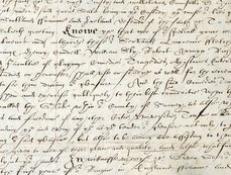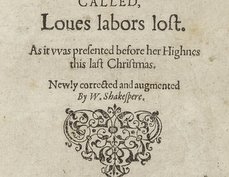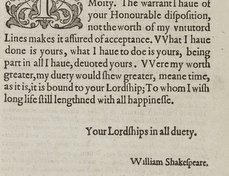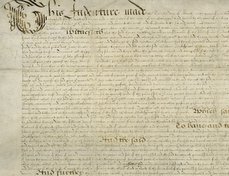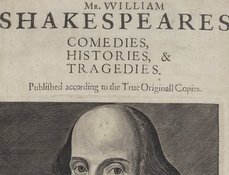Images reproduced by permission of The National Archives, London, England.
Terms of use
The National Archives give no warranty as to the accuracy, completeness or fitness for the purpose of the information provided.
Images may be used only for purposes of research, private study or education. Applications for any other use should be made to The National Archives Image Library, Kew, Richmond, Surrey TW9 4DU, Tel: 020 8392 5225 Fax: 020 8392 5266.
Document-specific information
Creator: Privy Seal Office
Date: May 17, 1603
Repository: The National Archives, Kew, UK
Call number and opening: PSO 2/22, pt. 2
View online bibliographic record
Alan H. Nelson, "King James establishes the King's Men: warrant under signet seal," Shakespeare Documented, https://doi.org/10.37078/423.
The National Archives, PSO 2/22. See Shakespeare Documented, https://doi.org/10.37078/423.
Although James VI of Scotland was proclaimed king of England on March 24, 1603, it took him over a month to arrive in London. Within ten days of his arrival there, and despite the fact that the theaters were closed due to plague, he gave instructions for turning the Lord Chamberlain's Men, of which Shakespeare was a member, into the King's Men.
This warrant for the Privy Seal is the first of three surviving administrative documents leading to the issuing of Letters Patent under the Great Seal that formally created the King's Men, although they do not explicitly refer to the players as the King’s. On May 17, 1603, in response to an instruction from the king in the form of either a Signed Bill or a King’s Bill (these bills do not survive prior to 1609), the Signet Office produced the formal warrant shown here. Known as a Signet Bill, it both instructed the Privy Seal Office to draw up a further warrant, and provided the text for the formal Letters Patent.
Accordingly, the next day on May 18, 1603, the Privy Seal Office issued a warrant under the Privy Seal, instructing the Lord Keeper of the Great Seal of England to further issue the Letters Patent under the Great Seal. Both documents (Signet Bill and Warrant for the Great Seal) supply the same text for the final document, the Letters Patent under the Great Seal delivered to Shakespeare’s company.
This warrant for the Privy Seal is sealed on the back with a paper star (in this case, four-pointed) over wax, a conventional method of sealing. The warrant is addressed, also on the back, “To our right trusty and wel beloued Counsellour the Lord Cecill of Esingdon keeper of our priuie Seal for the time being” (Robert Cecil was Keeper of the Privy Seal from 1598 to 1608). It is also endorsed, in a different hand, “The Players priuiledge.” The document was probably “filed,” or strung together with, a series of other warrants. It is (or was) either the 57th or 71st warrant in this file.
From the moment of enrollment, Shakespeare and the other players listed -- Lawrence Fletcher, Richard Burbage, Augustine Phillipps, John Hemings, Henry Condell, William Sly, Robert Armyn, Richard Cowley, "and the rest of their associates" -- were under the patronage of the king. According to the warrants and letters patent, after "the infection of the plague shall decrease," the players were free to perform at the Globe and throughout the country "for the recreation of our loving Subjects," as well as for the king's "solace and pleasure when we shall thinke good to see them." The Lord Chamberlain’s book, a roughly contemporary source, demonstrates that Shakespeare’s company was one of three companies patronized by the Crown: the King’s Men, the Queen’s Men, and the Prince’s Men, patronized by King James, Queen Anne of Denmark, and Prince Henry respectively.
Privy Seal records sent to the Lord Keeper or Lord Chancellor, including this warrant, were kept in Chancery from the time of their creation until 1884, when all such records were removed to the Public Record Office (now The National Archives).
[This transcription is pending final vetting]
[Image 1: recto]
By the king
Right trusty and welbeloued Councellor we greete you well and will and Commaund you yat vnder our priuie Seale in your Custody for the time being you Cause our lettres to be directed to the keeper of our greate
seale of England Comaunding him yat vnder our said greate Seale he cause our lettres to be made patentes in form following. James by the grace of God King of England Scotland ffraunce & Irland
defendor of the faith &c To all Justices Maiores Sheriffes Constables Hedboroughes and other our officers and loving subiectes greeting Knowe ye yat we of our speciall grace certein knowledge
& meere motion, haue licenced and authorized & by these presentes doo licence & authorize theise our seruantes Lawrence ffletcher William Shakespeare Richard Burbage Augustine Phillippes
John Henninges Henry Condell William Sly Robert Armyn Richard Cowlye and the rest of their associates, freely to vse and exercise the Arte and faculty of playing Comedies Tragedies Histories Enterludes Moralles Pastoralles Stage plaies & such other like as they haue already studied or heerafter shall vse or studie aswell for the recreation of our loving subiectes
as for our solace and pleasure when we shall thinke good to see them during our pleasure And the said Comedies Tragedies Histories & interludes Morrall Pastoralles Stage plaies & such like
To shew and exercise publiquely to their best Commoditie, when the infection of the plague shall decrease as well within their now vsual howse called the Globe within our Countie of Surrey
as alsoe within any towne Halles or Mouthalles or other convenient places within the liberties and freedome of anie other Cittie vniuersitie Towne or Borough whatsoeuer within our said Realmes
and dominions Willing and Comaunding you and euery of you as you tender our pleasure not only to permitt and suffer them heerin without any your lettes hinderances or molestacions
during our said pleasure, but also to be ayding and assisting to them yf any wrong be to them offered And to allowe them such former Courtesies as hath bene giuen to men of
their place and qualitie. And also what further fauour you shall shew to these our seruantes for our sake we shall take kindely at your handes In witnes wherof &c And these our lettres
shallbe your sufficient warrant and discharge in this behalf. Giuen vnder our Signet at our Mannor of Greenwiche the seavententh Day of May in the first yeere of our raigne
of England ffraunce and Irland, and of Scotland the six and thirtieth.
Examinatur per Lake
[Image 2: verso]
[SEAL]
To our trusty and welbeloued Counsellor the Lord Cecill of Esingdon keeper of our priuie Seale for the time being
[different hand] The Players priuiledge
Written by Alan H. Nelson
Sources
B. Roland Lewis, The Shakespeare Documents (1940), ii, 363-6.
Samuel Schoenbaum, Documentary Life (1975), pp. 195-7.
David Thomas, Shakespeare in the Public Records (London: H.M.S.O., 1985), p. 14.
Last updated February 1, 2020



